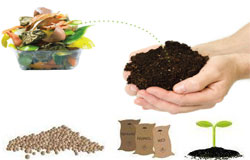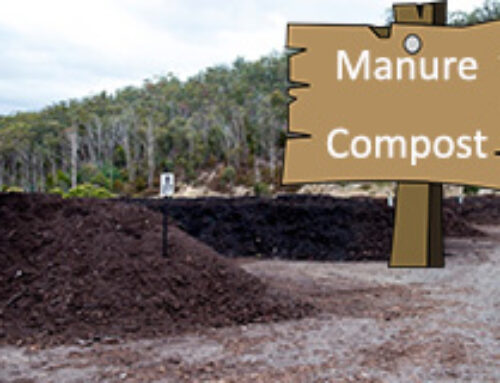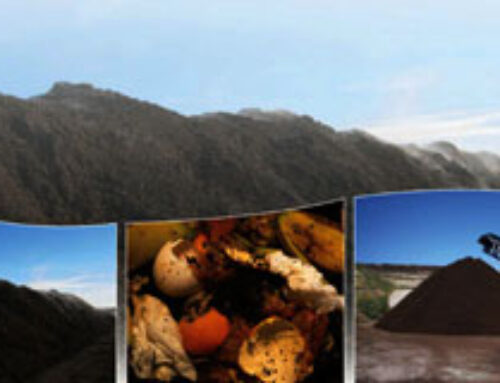Generally speaking, organic wastes, also called green wastes, refer to organic and waste materials produced during the process of production and life activities that people engaged in, mainly containing crop straw, organic household garbage, human and animal manure, etc. With the fast development of the economy and continuous improvement of people’s living standards, the quantity of organic waste has also increased dramatically with each passing year.
Every year we dump a massive 2.12 billion tons of waste. The waste flows in the agricultural industry and rural areas have a high share of organic matter, ranging from 40 to 85 percent. Similarly, organic waste accounts for more than 60 percent of MSW in low-income countries. According to the data from FAO, about thirty percent of food produced by the world for human consumption is lost or wasted each year, equal to about 1.3 billion tons of grain, one trillion dollars in economic cost, 700 billion dollars in environmental cost, and 900 billion dollars social cost. To the estimation of USDA, over 335 million tons of poultry/livestock wastes were produced on farms in the USA, about 100 times more manure than the quantity of human sewage sludge processed in US municipal wastewater plants. For instance, one dairy farm with twenty-five hundred cows 
is harvested, including leaves, stalks, and roots) only in North China is 83.0 Mt (Mt = Mega tonnes), while the average amount of total biomass residue of 105.7 Mt in Northeast China. Besides, only in Scotland, there were 2.47 million tonnes of household waste generated in the year 2015. Around 50% of household wastes and 30% of all wastes we throw away are organic, which represents so much wasted resource that fills limited landfill space. All these organic wastes should be regarded as a resource and several appropriate technologies exist for adequate treatment and resource recovery, including composting and granulating for organic fertilizer.
Problems of Organic Waste
Due to improper processing methods and inadequate processing efforts, organic waste has led to a series of environmental problems and social issues, including occupying land, polluting water, soil, and atmosphere, transmitting disease, causing public health, and so forth, affecting the stable and healthy development of the economy to some extent. What’s worse, organic wastes contain the affluent substances of energy sources that can cause secondary pollution as well as a huge waste of resources under the traditional process mode (like burying wastes in landfill). In addition, organic wastes can generate methane from anaerobic 
greenhouse effect higher than CO2) after being released into the air. Obviously, this processing mode cannot adapt to the developing requirements of the current sustainable economy and society.
Fortunately, there are three major methods to use organic waste – for soil improvement, for animal raising, and to provide a source of energy. Thereinto, there is a safe and effective method for processing green waste – using organic fertilizer granulators to granulate organic waste for recycling, not only relieving the pressure on the environment but also turning waste into treasure. For instance in Europe, even though more waste is being generated, the total amount of municipal waste landfilled has diminished. During the past ten years (2005-2015), landfilling has fallen by as much as 5.6 % per year on average. Most organic wastes have been used as crucial raw materials of organic fertilizer production and turned into organic fertilizers for soil improvement after the compost and granulation process. For now, Whirlston can offer three generalized and accepted approaches and machines for the granulation of organic waste, including a disc pan granulator, a new-type organic fertilizer granulator, and a flat die pellet mill.
Significance of Granulating Organic Waste for Fertilizer
Granulating organic waste is able to turn wastes into fertilizer, not only controlling nutrients more conveniently but also making dry and granular organic fertilizers that can be stored and packaged for sale. It is indisputable that organic fertilizer is one of the important fertilizer sources in agricultural production by virtue of its overall and balanced nutrients with everlasting fertilizer efficiency. Compared with chemical fertilizer, granulated organic fertilizer has irreplaceable superiority, not only improving soil structure and quality but also supplying nutrients for plants, which is of great significance to the development of organic, green, and pollution-free agriculture.
- Promoting soil quality: the soil is a non-renewable resource crucial for food production and ecosystem stability, thus it is critical for sustainable agriculture to improve soil health and reverse soil degradation. Granulating manure and crop residues and other organic wastes into organic fertilizers can enhance soil quality and reverse soil degradation because granulated fertilizer provides essential nutrients for plant production and raises soil organic matter content.
- Improving soil structure: granulated organic fertilizers increase soil organic matter content contributing to physical, chemical, and biological soil properties, improving the permeability of the soil and promoting the nutrient and water retention ability of soil, then realizing the improvement of soil structure and stability.
- Wide raw material sources: There is a significant volume of organic wastes to be used as raw materials for granulated organic fertilizer – from food wastes, livestock manure, and plant straws to other organic wastes, all of which are easy to find, almost everywhere to be seen. Therefore, it is easy to obtain raw materials locally so as to lower production costs.
- Proving rich nutrition for plants: granulated organic fertilizer provides a kinder, gentler way to give required nutrients to plants because these fertilizers are carbon-based compounds that increase the productivity and growth quality of plants, enhancing soil ecosystem, finally increasing crop production yield.
- Organic food production: Producing foods organically starts with organic fertilizers. Allowing plants, fruits, and vegetables to consume good microorganisms will lead to healthier, stronger, and thriving crops.
- Reducing pollution to the environment greatly: reducing and avoiding methane emissions through activities like organics recycling is one of the best ways to achieve a near-term beneficial impact in mitigating global climate change. Moreover, granulating organic wastes into fertilizers can greatly reduce soil and water pollution, protect the atmosphere from foul smells, decrease the incidence of disease, and then contribute to public health.
- Creating economic incomes: granulating organic wastes for fertilizer means creating considerable profits. As we all see, organic fertilizer has broad market prospects by virtue of its incomparable superiority – non-pollution, high organic content, and nutrient. Meanwhile, the rapid development of organic agriculture coupled with augmenting demand for organic food is expected to increase the demand for granulated organic fertilizers.




